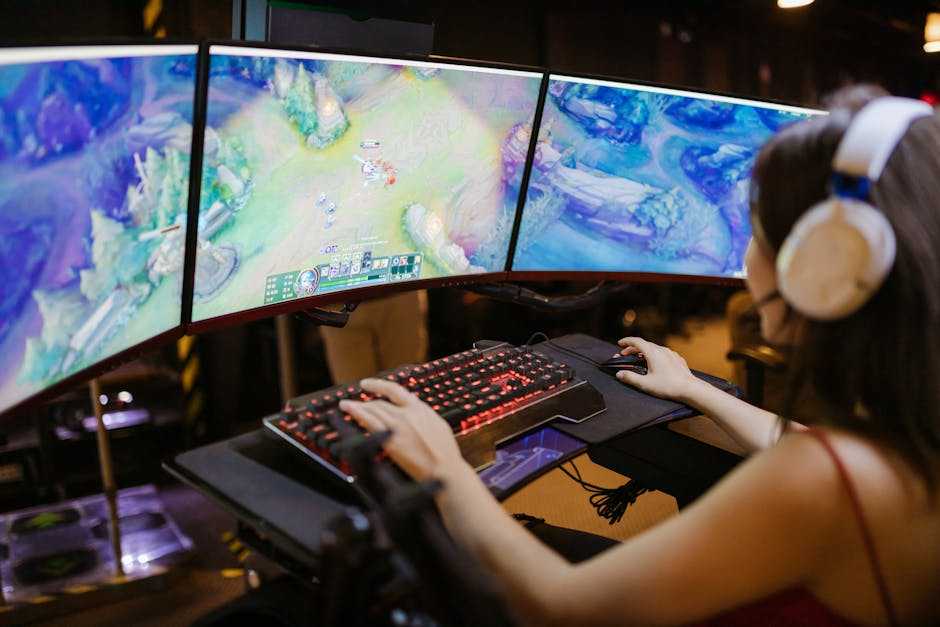The Rise of Esports Globally
Growth in Viewership and Sponsorship
Esports has seen exponential growth in viewership, with numbers surpassing 495 million viewers worldwide in 2020.
Platforms like Twitch and YouTube Gaming have created ecosystems where fans can watch their favorite players live.
Sponsorships have surged, with brands like:
- Coca-Cola
- Intel
- Red Bull
investing heavily in esports events.
Major tournaments now rival traditional sports in terms of prize money and media coverage.
For example, The International, an annual Dota 2 championship, offered over $40 million in prize pools in 2021.
Impact on Youth and Culture
Esports significantly impacts youth culture. It offers not only entertainment but also career opportunities in playing, streaming, and coaching.
Schools and universities have started offering esports programs and scholarships, acknowledging its educational and athletic value.
Competitive gaming has shifted perceptions, making gaming a viable career path.
Esports also fosters community by bringing together people from diverse backgrounds, breaking down geographical and cultural barriers.
It’s shaping the next generation’s media consumption and lifestyle choices.
The Debate: Esports in the Olympic Games
Arguments for Inclusion
Esports, defining the future of competitive entertainment, fits naturally into the Olympic Games due to its massive global reach and popularity.
Viewership, which exceeded 495 million worldwide in 2020, signifies a broad fanbase.
Platforms like Twitch and YouTube Gaming facilitate direct engagement, elevating the community experience.
Major brands like Coca-Cola and Red Bull sponsor events, drawing even more attention to the potential inclusion in the Olympics.
Prize pools in esports often rival traditional sports, showcasing its competitive nature.
For example, The International 2021, a Dota 2 tournament, boasted a prize pool of over $40 million.
This financial investment underscores the seriousness and professionalism within the esports realm.
Incorporating esports could modernize the Olympic Games, attracting younger audiences who typically consume media through digital platforms.
Furthermore, esports fosters inclusivity.
Unlike traditional sports, it provides opportunities regardless of physical ability, opening the door to a broader range of athletes.
Schools and universities are already embracing esports, offering programs and scholarships, recognizing its educational and athletic value.
Integrating esports into the Olympics could reflect the evolving landscape of sports and its role in education and career development.
Arguments Against Inclusion
- Despite its growing popularity, some argue against including esports in the Olympic Games due to several factors.
Traditional sport purists claim that physical prowess is essential, and esports, primarily involving mental and limited physical exertion, doesn’t fit this criterion.
The Olympic charter emphasizes physical performance, making the inclusion of esports challenging under the current definitions.
- Another concern is the diversity of game genres. Unlike traditional sports with established rules and histories, esports consist of various games with different mechanics, making standardization difficult.
Ensuring fair and consistent gameplay across diverse genres poses a significant challenge for the Olympics.
- Moreover, the issue of violent content in many popular esports titles worries the Olympic community.
Games like Call of Duty and Counter-Strike feature combat scenarios, conflicting with the Olympic spirit promoting peace and unity. Addressing these concerns would require careful selection and regulation of suitable esports titles.
- Lastly, there’s the matter of intellectual property. Unlike traditional sports, where rules and regulations are public domains, esports games are owned by private companies.
These companies have control over game mechanics, updates, and rules, complicating the governance and standardization essential for Olympic inclusion.
- Balancing these challenges with the arguments for inclusion forms the core of the ongoing debate surrounding the future of esports in the Olympic Games.
Challenges Facing Esports’ Olympic Inclusion

Standardization of Rules
Esports involve diverse games (e.g., MOBA, FPS, RTS), each with unique mechanics and rules.
Unifying these under a standardized Olympic format poses a major challenge. Traditional sports (e.g., soccer, basketball) have long-established, universally accepted rules, making standardization easier.
Esports must undergo a rigorous process to ensure consistency and fairness, accommodating various game genres while maintaining competitive integrity.
Some games frequently update, presenting additional complexities in rule standardization and consistency over time.
Technological and Infrastructural Needs
The unique technological requirements for esports contrast sharply with those for traditional sports.
High-performance equipment, robust internet connections, and advanced software form an integral part of esports events.
Olympic venues designed for physical sports (e.g., stadiums, arenas) need significant adaptations to meet these technical needs.
Ensuring low latency and preventing cheating requires cutting-edge infrastructure.
Cybersecurity is also crucial, necessitating measures to protect both the competition and personal data of participants.
This demands substantial investments and specialized expertise, which differ from traditional Olympic preparations.
Potential Benefits of Esports in the Olympics
Increased Diversity in Olympic Events
Esports offers a unique chance to diversify the Olympic Games.
Traditional sports, like track and field or swimming, typically require physical prowess.
In contrast, esports requires strategy, quick reflexes, and team coordination.
Including esports could attract a new audience segment and provide more variety.
Events could cover a range of genres, from real-time strategy to first-person shooters, if violence concerns are addressed.
Moreover, esports athletes hail from diverse backgrounds, enhancing the inclusivity of the Olympics.
Enhanced Global Engagement
Incorporating esports into the Olympics would likely boost global engagement.
Esports has a massive international following, drawing millions to online platforms and live events.
By tapping into this existing fan base, the Olympics could attract younger viewers.
Platforms like Twitch and YouTube Gaming already show high levels of viewer interaction during esports competitions, indicating strong engagement potential.
This expanded viewership could help the Olympics remain relevant to younger generations, who are digital natives and avid esports fans.


 Charlie Bracegirdle seamlessly combines his passion for gaming with his role at Infinity Game Saga, where he is both a dedicated gamer and a prominent content creator. As an integral member of the team, Charlie brings a wealth of experience and a deep understanding of the gaming industry to his work. His articles and content cover a broad spectrum of gaming topics, from detailed reviews and insightful industry analyses to the latest trends and upcoming releases.
Charlie’s unique perspective, shaped by his own extensive gaming experiences, allows him to engage with readers in a meaningful way. His writing not only informs but also entertains, providing a blend of professional insight and personal enthusiasm. Whether he's exploring new game mechanics, dissecting game strategies, or sharing his thoughts on the future of gaming, Charlie's contributions make a significant impact on the Infinity Game Saga community. Through his work, he bridges the gap between gamers and the evolving landscape of the gaming world, enhancing the experience for all who follow his updates and analyses.
Charlie Bracegirdle seamlessly combines his passion for gaming with his role at Infinity Game Saga, where he is both a dedicated gamer and a prominent content creator. As an integral member of the team, Charlie brings a wealth of experience and a deep understanding of the gaming industry to his work. His articles and content cover a broad spectrum of gaming topics, from detailed reviews and insightful industry analyses to the latest trends and upcoming releases.
Charlie’s unique perspective, shaped by his own extensive gaming experiences, allows him to engage with readers in a meaningful way. His writing not only informs but also entertains, providing a blend of professional insight and personal enthusiasm. Whether he's exploring new game mechanics, dissecting game strategies, or sharing his thoughts on the future of gaming, Charlie's contributions make a significant impact on the Infinity Game Saga community. Through his work, he bridges the gap between gamers and the evolving landscape of the gaming world, enhancing the experience for all who follow his updates and analyses.
